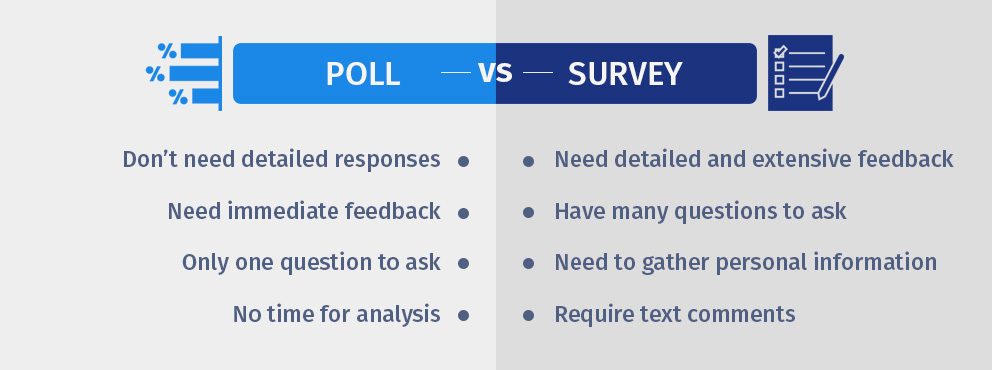
Poll and Survey: Definition
Poll: A poll is a way of knowing people’s choices and understanding what works for them.
Polls can help you to measure the success of any event or initiative and are carried out at various stages. The interval at which polls are conducted depends on what kind of data needs to be extracted from the respondents.
In the past, polls were mostly carried out in-person. A question used to be given to a group of people, who were asked to raise a hand to express their opinion. Later came the telephone polls wherein a respondent would be asked to dial a number as an answer. Today in the digital world, polls are conducted online and all a user has to do to answer is just click.
Online polls help in market research by providing data on customers’ preferences and thereby can help create a strategy. If an organization knows better what a customer wants, then chances of their success increases. Polls can also help predict demand and help businesses better prepare themselves for the future.
Learn: How to create a poll
Survey: A survey gathers information from a set of people, with the purpose of generalizing the results to a larger population. Surveys provide a significant source of data and insights for almost everyone in the information business, from government and private organizations to media and academic institutions.
Thousands of surveys are created every year to understand the choices, preferences, and experiences of customers and employees. Surveys are conducted in different formats and distributed through various mediums. In olden times, surveys were carried out in-person and over the call. Later, these were replaced by pen and paper surveys. Nowadays, most companies run surveys online using free online survey builder tools.
Online surveys consist of different types of questions such as single choice, multiple-choice and open-ended text. When the online surveys were new in the market, it was more or less text or choice based questionnaire, but with the growing use of multimedia over the internet, you can include graphical, matrix, and audio/video questions as well. The responses are gathered through the email, website, QR code or survey mobile app.
Once the responses are collected, you can run different data analytics algorithms and generate meaningful insights in the form of reports. These reports can also be exported in most commonly used formats such as .xls, .pdf or .ppt.
Learn: How to create a survey
Poll and Survey form an important part of market research as major business decisions are taken based on data collected directly from the users. Both have applications in all industries due to their ease of operations and simplified analytics.
Poll: Election poll
Online polls are created during elections and give insights on the probability of a particular political party winning the seat. It gives them an idea of how popular their party candidates are in that region. Election polls can help de-code what are the choices of different sections of the society, what concerns them most and what do they wish from the future government.
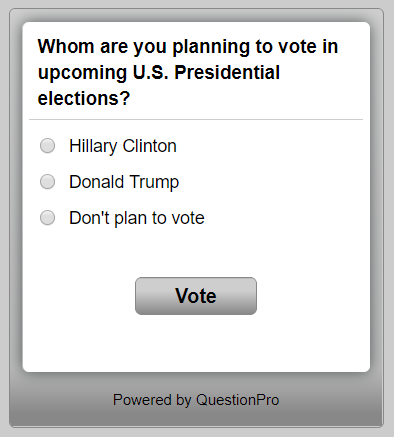
Survey: Customer satisfaction survey
The goal of every organization is to keep its customers happy. Learning about customers’ experiences can minimize future negative feedback as they help you to improve operations and quality of products and services. Customer satisfaction survey asks a number of questions that evaluate their overall experience and help companies get a glance at whether they are likely to continue.
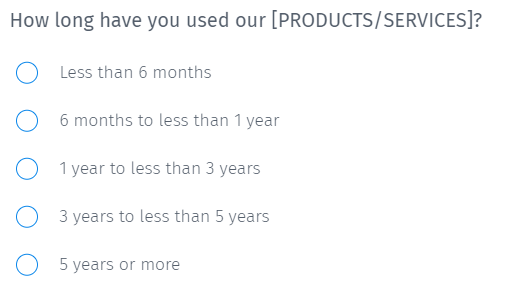
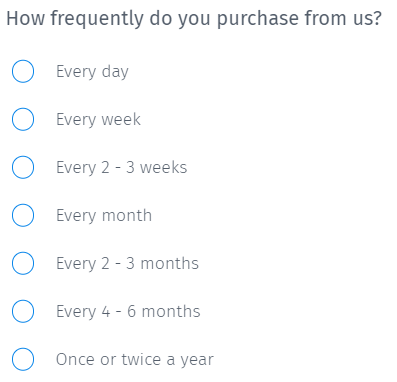
Customer Satisfaction Survey Template
Poll vs Survey
Both poll and survey are used to gather feedback and choices of the target audience. In the same industry, both poll and survey can be used to gain insights that will help to make better business decisions. Due to their overlapping usability, one is bound to get confused as to when to select what. The selection between online polls and online surveys is made on the basis of the number of factors such as:
-
Questions
Polls consist of only one question which can be single-choice, multiple choice or an open-ended text question. Surveys consist of a number of questions across a wide range of question types such as multiple choice, ratings, matrix, heatmap, multimedia, and ranking questions.
-
Time
Because online polls have only one question, it doesn't take much time to create them. For the same reason, they are also quick to respond. They are very easy to customize and can be quickly embedded on the website. Due to these reasons, polls are considered to be very simple and light.
-
Depth of information
Polls questions gather opinion on a single subject and the respondents are usually not asked for any personal information and are, therefore, an anonymous form of feedback. Surveys gather views on multiple topics and extract detailed information. You can also ask for personal information like email address, age, name or profession, if needed.
-
Purpose
Polls are generally conducted before an event, while an event is going on to know the outcome of an event or immediately after the event. They catch the thoughts on the top of the mind and doesn’t require too much effort on the respondent’s side. Surveys, on the other hand, used for conducting satisfaction and experience surveys.
-
Type of decision
Polls are used to make a simple and quick decision as they consume less time and resources. Surveys are used when you need to make a detailed analysis of the responses gathered. They capture various dimensions of feedback and translate that data into charts and reports that help in creating a better business strategy.
When to use poll
Create free online polls when you need a quick shot insight into customers choices and feedback and don't need a detailed analysis of their preferences. Like a survey, you can filter results, create criteria and reports for polls as well, but they will be based on the responses to a single question only. When you don't need vast data to draw conclusions, go for online polls.
Also, polls let respondents view how they stand as compared to others. Thus, it gives them a relative glimpse of their choice versus the complete set of respondents.
Example: A company has committed 1% of its profits to charity. However, it wants its employees to decide where they should spend it. In such a case, it should create a poll for its employees and make it live on the company’s intranet portal, asking for their preferences.

When to use survey
A survey is lengthy and requires more time to respond as compared to a poll. Many types of data analytics algorithms are applied on the responses collected and the insights generated are conveyed to various departments of an organization. Hence, if you have a lot of time to generate reports and share it with your team members, surveys make a good choice for you.
Example: If a smartphone company recently launched a new mobile phone they can run a product satisfaction survey for their buyers to evaluate customer service experience, product use satisfaction, process evaluation, etc. They can ask questions on specific existing features and what new features they would like to see. If too many people want an enhanced camera and picture quality, then their design team needs to put more effort. If the company gets good feedback for the performance of the processor, then they would want to retain the same in the new models, if not improve it. However, it will be at a lesser priority than the camera and picture quality needs.
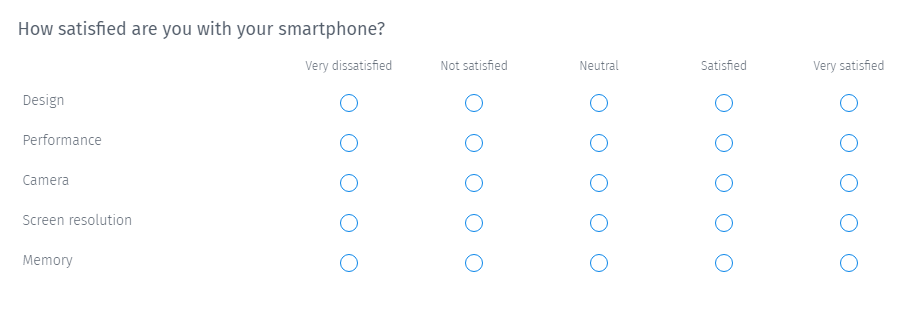
Create a Free Poll
Survey Software Easy to use and accessible for everyone. Design, send and analyze online surveys.
Research Suite A suite of enterprise-grade research tools for market research professionals.
Customer Experience Experiences change the world. Deliver the best with our CX management software.
Employee Experience Create the best employee experience and act on real-time data from end to end.

















